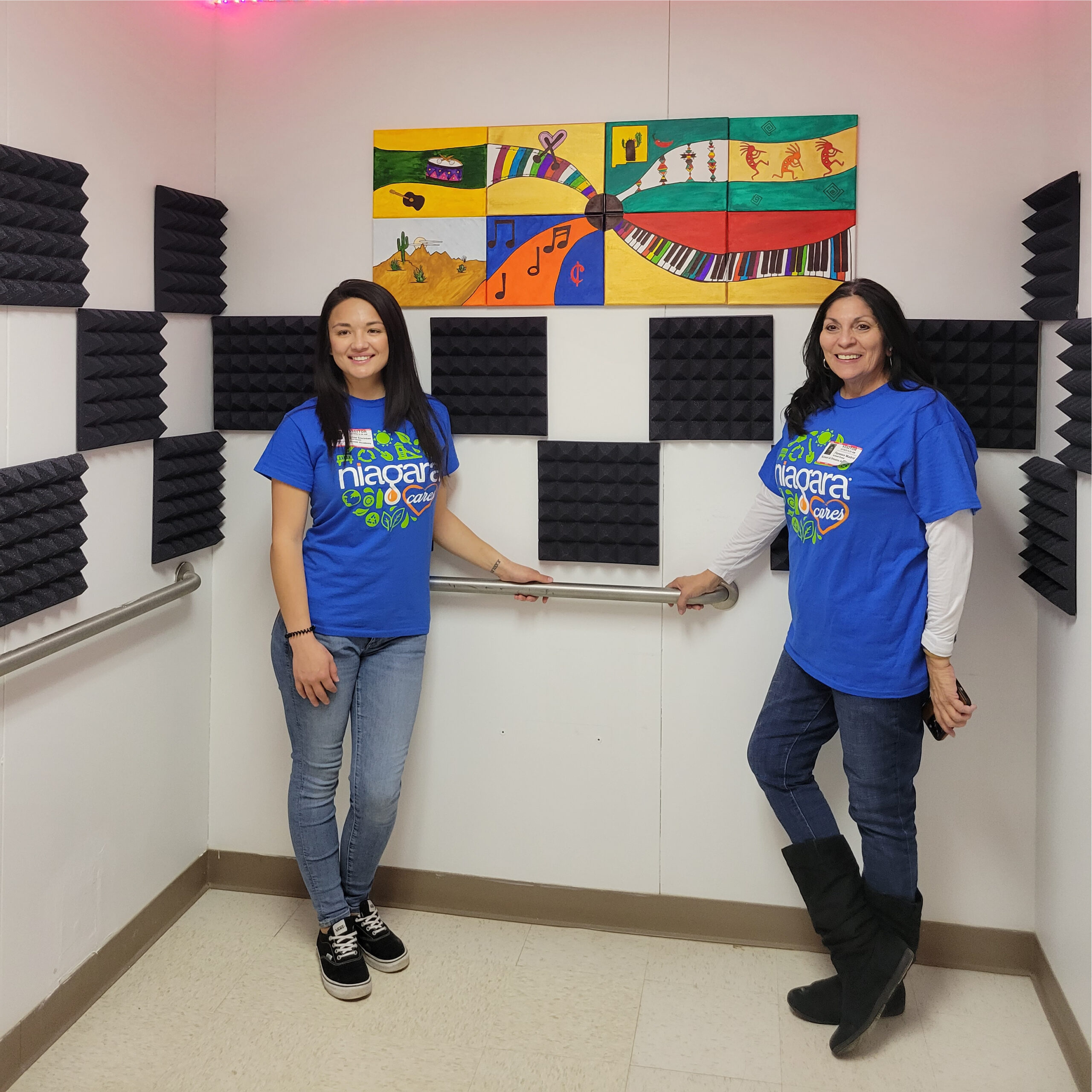Songwriting Exhibition
Submit your original compositions!
Teachers and parents are invited to submit original compositions by kids for Music Will’s National Songwriting Exhibition! The Exhibition celebrates the creativity of kids and offers them a platform to share their music with the world. Participating students will receive a virtual prize pack and be entered for a chance to win prizes*. After the submission period, a selection of original compositions will be featured on Music Will’s online gallery.
*Prizes to be announced
Submit Your Song
HOW DOES IT WORK?
Songwriting Exhibition Rules
- The Songwriting Exhibition opens on March 18, 2024. All submissions must be entered by 11:59 pm PT on April 24, 2024.
- Each song should be an original composition created by a student 18 or under and currently enrolled in grades P-12.
- Express yourself! Songs should be at least 45 seconds long.
- Recordings may be submitted in either audio or video format.
- Students may be featured in multiple songs. Limit one prize entry per student composer.
- Adults are free to accompany students on recordings but this should be noted on the entry form.
- School teachers or parents/legal guardians should submit on behalf of students. In order to ensure student privacy, students won’t be able to submit their own songs!
- Every song submission should be accompanied by a completed Digital Media Release form (English / Spanish) for each student participant.
Be sure to review the [Official Rules].
Questions? Email us at [email protected].

Not sure where to begin with songwriting?
These lessons for songwriters of all ages and skill levels make songwriting easy!

Songwriting with Mary

Hip Hop Songwriting
Don’t have an instrument at home? No problem!
The Songwriting Exhibition is open to submissions of acapella performances, junk drumming, digital music productions, and anything else you can make sound with!

Making Music with Soundtrap

Junk Drum Set

Body Drumming
Songwriting Tips from our Teachers
We asked our teachers to share their songwriting advice. Read below for some useful tips and tricks to help you with your writing.
How to Begin
I have started the songwriting process by asking someone to tell me one word or a short phrase. Then I play a simple chord progression on the guitar or keyboard and ask them to repeat the word or phrase as I play. Sometimes a melody takes shape and more words come. Sometimes other students chime in, adding words or phrases. Then, I get them, if they can, to write it down. After that, we sing and play it. A song is born. I want them to see that all it takes is one word or phrase.
– Robin Diamond, P352X Vida Bogart School @ 75, New York
I tell students the hardest part is getting started. So just start. Once you actually begin creating, you’ll be naturally motivated to continue!
– Melissa Davis, Deerfield Community School, New Hampshire
Choose whether you want to start with melodic/harmonic elements or lyrical/rhythmic elements first. Use that as a jumping off point, and don’t try to do them both simultaneously if you’re feeling a block. I like to focus on one element at a time (words or music).
– Andrea Donze, Spruce Elementary School, Washington
Process
Sketch out your song! Writing is a continuous process, so grab inspiration when it strikes! Write down/record ideas (melody lines, lyrics, etc.) when they happen and revisit them later. Think of the message you’re trying to convey and let that lead you as you work with all the elements of your song. Thinking of the arc of storytelling may help as well. Sketch. Play. Evaluate. Refine. Songwriting doesn’t always happen in one session!
– Kaitlin Ernest, Lacey Spring Elementary School, Virginia
Trust the process: Write, Record, Listen, Revise, and Refine. Keep it simple and stay mostly in your comfort zone. “Mostly” meaning pick 1 chord or 1 strumming pattern that you have been practicing but haven’t quite mastered yet to include in your composition. And don’t worry, if it doesn’t work out you can always change it to something different.
– Zebediah Allen, Beethoven Elementary School, Illinois
It’s okay to repeat.
– Teresa Stachofsky, Lakeside Middle School, Indiana
Music
Use common tones to create good chord progressions. Look at two chords – usually if one or two keyboard keys (or finger position dots) match, the sound as you move from one chord to another will sound smooth and pleasing.
– Rick Auvil, United School District, Pennsylvania
Write everything in the key of C, then transpose if you have to. It’s easier to think through your ideas that way.
– Rick Auvil, United School District, Pennsylvania
If you are focusing on the musical aspect, get a solid format down first, or order, to the song. Structure will help drive the song forward.
– Eden Sloop, Granite Quarry Elementary, North Carolina
Lyrics
Write about something you’ve experienced. It can be happy, sad, angry, etc. You can more easily write about something you have done or a feeling you have felt.
– Rebekka Green, James Shields Middle School, Illinois
Use tools to help. We practice rhyme schemes and I have them use a website called rhymezone.com = LIFE SAVER.
– Rebekka Green, James Shields Middle School, Illinois
Write a bunch of words that are on your mind and cut it up into pieces and rearrange the words. (This is a) technique developed by William S. Burroughs and used by artists such as David Bowie. Love this and so much fun and easy approach for students!
– Becca Tinsley
Why don’t you start with a message? What do you want to say to the world? Or a specific person? Write down your message then imagine music that would go with it.
– Maria Fritts, Alliance Stern Math and Science School, California
Tips for Teachers
My trick is to start early! Start in Kindergarten on how to write notes, how to form symbols and make them neat. I give prizes for neatness therefore creating better writing when they understand measures, chords and can use their creativity.
– Rochelle Mundfrom, S. Christa McAuliffe STEM Academy, Colorado
My favorite trick to songwriting with elementary students is to create a class song first so that they can have a guided model of how to approach writing their own song. Once that is done, the students can choose to work in groups or alone and are allowed to select their own topic on which to write. I find that if they have a true connection to their writing, the ideas flow easily for them.
– Jennifer Moats, Clark Elementary, Florida
Create a chorus to a song as a class and have students create verses in groups for that topic, using a word bank that the class came up with previously. Giving students parameters at first eases the fear of starting on a blank slate.
– Jennifer Moats, Clark Elementary, Florida
I like to have my kids start with a title. (I have a few ways to help come up with those using words clouds and other tools like that) and then type their title and do a Google image search and describe what they see, particularly focusing on action words. Then they come up with a list of questions suggested by their title. Between the two they have a bunch of snippets of possible lyrics and try to connect them. We chose a chord progression that fits the mood and try to sing the lyrics over the progression to find the natural rhythm and phrasing of the words. From there it’s just a matter of making adjustments to the lyrics and chord changes to get everything to fit together. My first assignment to introduce them to songwriting is usually “write a bad song quickly” where I give them a prompt like what is your favorite food or what’s the last game you played and we follow the steps to make something nonsensical and get their creative juices flowing while introducing them to the techniques and having some laughs.
– Brian Forbes, Encore Jr./Sr. High School for the Perf and Visual Arts, California
Attitude
Don’t be afraid of what others are going to think of your music. The biggest thing that holds people back from truly expressing themselves is being self-conscious. Just be real with people, and they’ll love it.
– Robert Pennington, Curwensville Area Jr./Sr. High School, Pennsylvania
Don’t over think. Take the music where your ear takes it.
– Bobbi Jo Carroll, Shambaugh Elementary, Indiana
Other
Register your music with the Copyright Office (https://www.copyright.gov/). It’s not very difficult or expensive, and there are many good reasons to do so.
– Ed O’Connell, Venice High School, California


